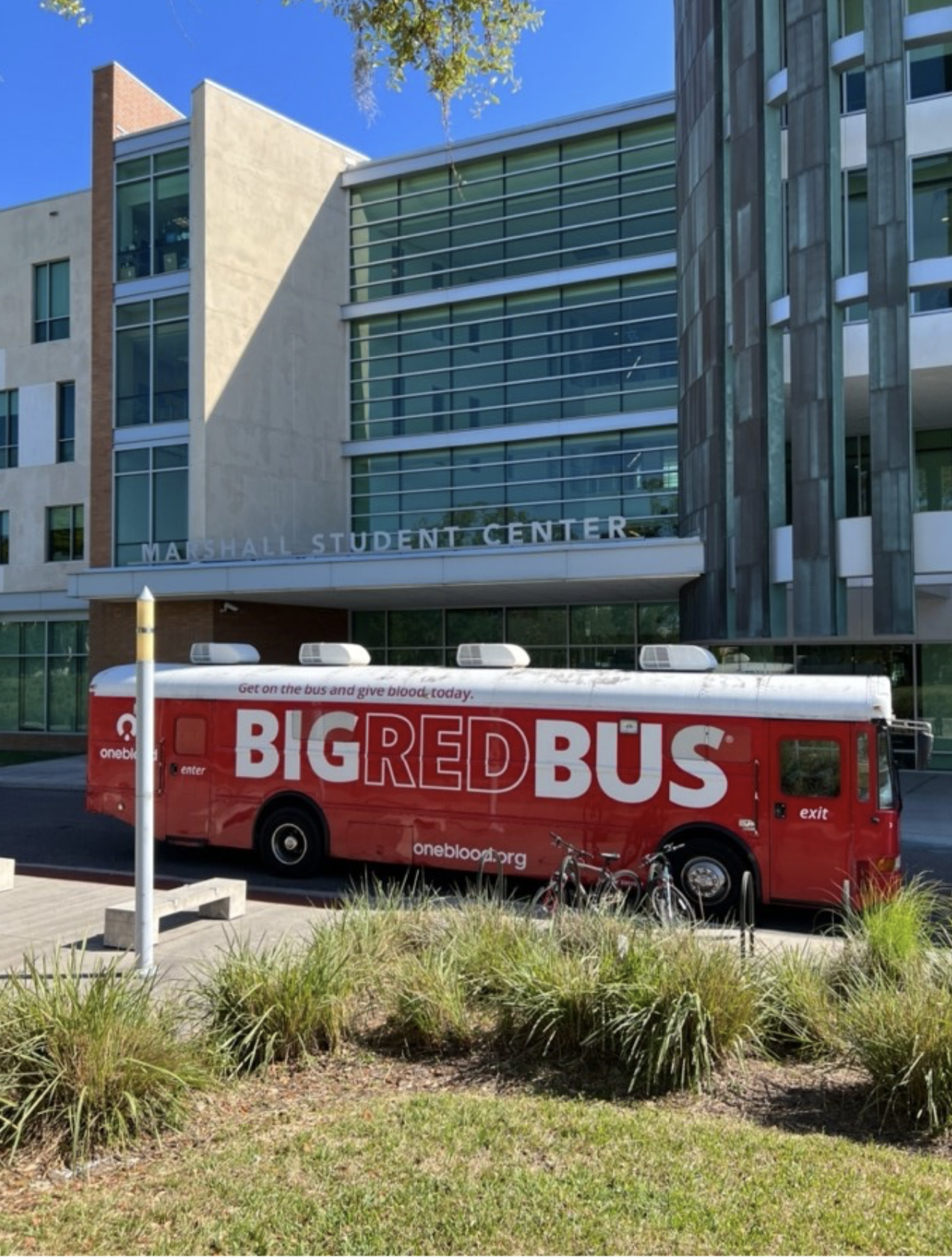“The more people that donate the greater possibility we have to save someone else’s life.”
Courtesy of Courtney Brown
By Courtney Brown
At the University of South Florida’s Tampa campus, the Big Red Bus has stationed itself outside of the Marshall Student Center. Inside workers and donors talk about blood shortages, incentives and the impact of saving a life.
Many people are familiar with the Big Red Bus. Occasionally they appear all over Central Florida, parked at local grocery stores, malls and even stopped at high schools.
Phlebotomist Omar Hopkins comes to USF campuses about once every two weeks. Hopkins has been working at OneBlood inside the Big Red Buses for five years.
With so many locations for donors, a lot of people don’t see the importance of donating. The 23-year-old team leader said it’s all about the potential lives saved.
“I feel like it’s so important to donate because it saves lives. A lot of people have diseases, and many bodies don’t make the cells needed to survive,” Hopkins said.
According to The Red Cross, Every two seconds someone in the U.S. needs blood or platelets. Approximately 29,000 units of red blood cells are needed every day in the U.S.
The issue of shortages is one of the main discussions on the bus.
“There is a shortage depending on the blood type. For example, O negative. There is always a shortage of O negative,” Hopkins said.
According to OneBlood.org, only 7 percent of the population has O-negative blood, yet it’s the highest blood type in demand. This is because O negative is the universal donor, meaning it has the ability to save anyone in need of a blood transfusion, unlike other types which have to be a specific match.
Phlebotomist Melissa Bazqez also shared that COVID-19 caused a shortage of donors,
“From my understanding, there has been less blood doners since COVID came. So, they don’t have that many people come and donate, and we really need them because we do have patients in need of blood,” she said.
Bazqez has been working for One Blood since September. She knows how crucial the pints of blood can be for others.
“You’ve got pediatric patients in the ICU, car accidents, cancer and trauma patients that need blood. This is an everyday thing, and someone needs blood every minute of the day. The more people that donate the greater possibility we have to save someone else’s life,” she said.
USF Sophomore Apollo Hamilton hopped onboard the Big Red Bus to donate. Their main motivation: help with the blood shortage.
“I like to be informed and there has been a blood shortage for quite some time. I’ve recently been eligible to donate, so I wanted to,” they said.
Previously, the USF student was on medications that didn’t allow blood donation. This is Hamilton’s first time donating and they plan on making this a reoccurring trip.
College students seem to be a great source for donors. Hopkins feels the students are more willing to donate than others.
“I feel like it’s way easier for to get college students to actually donate. Compared to other places we go to like Walmart; many times, people want to know exactly what we are giving out. When we come to college students, they really don’t look for the incentive. They just do it because they want to,” Hopkins said.
Much like Hamilton, who said they would have donated regardless of gifts and rewards.
When talking about incentives, Bazqez does see a fluctuation of donors depending on the types of gifts given out at the time.
“We see a lot of people come out when it comes to festivals or Orlando Magic tickets. Carrabba’s is a crazy drive too because they get a discount,” Bazquez said.
OneBlood recently had a promotion in partnership with radio station US 103.5. They gave away a pair of tickets for Taylor Swift’s Tampa show when they donated on April 6 at one of their select locations.
To see more incentives given out in your area visit OneBlood.org
Besides a gift card and t-shirt, donors can get other advantages when they visit the Big Red Bus. After donating, donors receive results that show their cholesterol levels, vital signs and blood type.
According to BatonRougeGeneral.org, about 33% of Americans do not know their blood type. Knowing your blood type can help you understand the risks of developing certain medical conditions in connection to your blood type. Donating your blood can be a great resource for those wanting to know what their blood type is.



